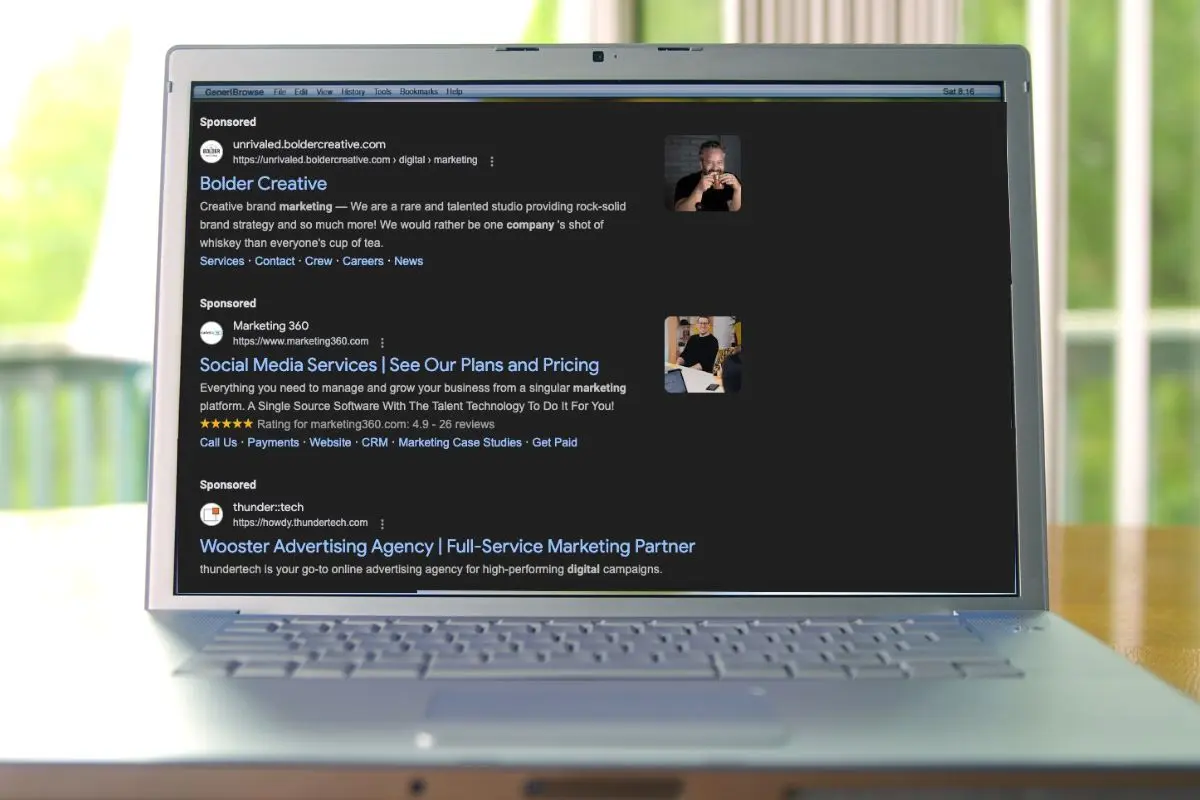Are sponsored websites safe?
The Dangers of Sponsored Ads in Google Searches
In today’s digital age, search engines like Google are gateways to the internet, connecting us to all sorts of information, products, and services with a simple search. However, not everything that shows up on Google is as reliable or safe as it might seem. Below we look as some of the dangers of sponsored as in google searches. One particular area of concern is the prevalence of Sponsored ads in Google searches. These ads are often displayed at the top of search results and might seem like convenient shortcuts to what you’re looking for, but there are real dangers in clicking them without caution.
In our opinion it is just not worth clicking on Sponsored ads at all, as the risks outweigh the rewards. After all, right below the sponsored ads are actual search results to verified small business or companies that have invested time and effort into making sure their products and services visible to you. Below is information that can help you understand more about sponsored ads, the dangers they can pose and how you can protect yourself.
What Are Sponsored Ads?
Before diving into the dangers of sponsored ads in google searches, let’s quickly define what sponsored ads are. When you type a search query into Google, you’ll typically see results marked with a little label that reads “Ad” at the very top of the page. These ads are paid for by businesses through Google Ads (formerly AdWords). Companies bid on keywords, hoping their ads will appear in searches relevant to their services. Sounds straightforward, right? Well, not quite. This is where the risks start to surface.
The Lure of Convenience
Sponsored ads are designed to be tempting. They’re often the first thing you see and may appear to provide exactly what you’re searching for. For example, if you’re looking for “best phone deals,” the first few results might be sponsored ads from vendors offering great prices. This ease of access, while appealing, can lead to a host of problems if you aren’t careful.
Here are some key dangers of sponsored ads in google that you should be aware of:
1. Clicking on Fraudulent Ads
One of the biggest dangers of sponsored ads is the risk of clicking on a fraudulent or malicious link. Not all advertisers on Google have good intentions. Cybercriminals often use paid advertising to create phishing scams, fake websites, and malicious downloads. For instance, you might click on an ad promising an attractive offer only to be redirected to a fake landing page designed to steal your information.
These ads can look shockingly authentic. Scammers go to great lengths to mimic legitimate businesses, making it difficult for even the tech-savvy to tell the difference. In other cases, ads may direct users to sites laced with malware or spyware, putting your computer, and personal data at serious risk.
2. Overpriced or Misleading Offers
Another common issue with sponsored ads is that they may lead you to overpriced or misleading offers. Because advertisers bid to show up in your search results, it’s possible that the ads aren’t necessarily the best or cheapest option for you. Instead, they’re just paying more to be in front of your eyes.
You might see an ad offering a particular product or service at a “discounted” price, but in reality, it’s the same or even more expensive than what you’d find through organic search results. Advertisers know how to manipulate language and pricing to make their deals seem enticing, leading many users to unknowingly overspend.
3. Data Collection and Privacy Concerns
When you click on a sponsored ad, you may be unknowingly sharing a lot of your data with advertisers. While large companies often have strict privacy policies, smaller or less-reputable advertisers may be far less scrupulous. Some sponsored ads redirect you to websites that aggressively collect user information, including browsing history, personal details, and even payment information.
These ads often employ tracking cookies and other technologies to gather data on your online behavior. While this isn’t inherently harmful, it raises privacy concerns, especially if advertisers aren’t transparent about how they collect and use your data. The risk becomes even more significant if the website you’re redirected to has poor security practices, putting your data at risk of theft or unauthorized use.
4. Misrepresentation and Lack of Accountability
One more danger of clicking on sponsored ads is the potential misrepresentation of products or services. Unlike organic search results, which are ranked based on relevance and credibility, sponsored ads are all about who pays the most. As a result, you could end up on a site that makes false claims or sells low-quality or counterfeit products. Even if you’re redirected to a legitimate-looking website, there’s no guarantee that what you’re getting is what was advertised in the ad.
If you experience a problem after purchasing from a company through a sponsored ad, seeking accountability can be difficult. Google Ads tries to monitor and restrict bad actors, but it’s not foolproof. It’s often a cat-and-mouse game, with scammers constantly finding ways to bypass regulations and slip through the cracks.
5. The Fine Print: Hidden Fees and Subscriptions
Another danger to watch out for is the prevalence of hidden fees or subscriptions in ads. You might click on an ad advertising a “free” service or a heavily discounted product, only to find yourself charged for additional services or signed up for recurring payments. Some companies use ads to funnel unsuspecting users into sneaky subscription services. Often, the details are buried in fine print or hidden in confusing terms and conditions that the average user might not read carefully.
How to Protect Yourself
Now that we’ve covered the potential dangers of clicking on sponsored ads, here are some ways to protect yourself:
1. Verify the URL: Always hover over the link and double-check the URL before clicking. Look for subtle changes in spelling or slight modifications that might indicate a fraudulent site.
2.Use Ad Blockers: Consider using an ad blocker to minimize exposure to sponsored ads. While it won’t eliminate all risks, it significantly reduces the chances of clicking on a malicious link by mistake.
3.Research Before You Click: Instead of relying solely on ads, take a few extra seconds to scroll down and check the organic search results. It can be worth looking up reviews or consumer reports about a company you’re unfamiliar with.
4.Look for Secure Websites: Always make sure the websites you click on have HTTPS in the address bar, indicating a secure connection.
5.Trust Your Instincts: If an offer seems too good to be true, it probably is. Take a moment to reconsider before rushing into a purchase.
While not every sponsored ad is dangerous, the risks associated with them are very real. Fraudulent ads, misleading deals, and privacy concerns can turn a seemingly harmless click into a potential nightmare. By being cautious and aware, you can avoid many of these pitfalls and have a safer browsing experience.
Remember, the convenience of clicking a sponsored ad is never worth compromising your data or money. Always do your research, verify the legitimacy of sites, and use common sense to stay safe while navigating the digital world.
Feel free to contact Jus B Media.

